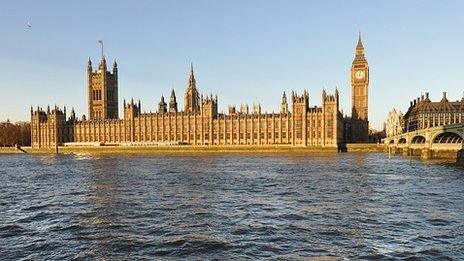Coalition row after MPs recall plan is shelved
- Published
Zac Goldsmith: "David Cameron has behaved appallingly over this"
Politicians look like they are "running scared", a senior Lib Dem has said, after plans to allow voters to remove MPs between elections were dropped.
Plans for a "power of recall" for MPs who have committed "serious wrongdoing" have been abandoned following a dispute between the Tories and Lib Dems.
Lib Dem Party President Tim Farron said the "modest" plan was blocked by the prime minister David Cameron.
But Tory MP Zac Goldsmith said he was "disgusted" by the Lib Dems' actions.
The Independent , externalreported that the plans would not be included in May's Queen's Speech, the last chance for them to become law before the 2015 election.
The idea, which was proposed in response to the public anger about the 2009 parliamentary expenses scandal, was included in both the Conservatives' and Lib Dems' last general election manifestos.
In their 2010 Coalition Agreement, both parties promised "early legislation" to allow voters to force a by-election "where an MP is found to have engaged in serious wrongdoing".
'Protecting their own'
When a draft bill , externalsetting out plans was published in 2011, there was some criticism that the threshold for triggering the recall of an MP had been set too high.
As well as 10% of constituents having to sign a petition demanding it, a committee of MPs would first have to decide if serious wrongdoing had taken place.
But there were also concerns that a system of recall - which is in place in many US states - could lead to vexatious and politically-motivated campaigns against MPs.

The government has already abandoned plans for reform of the Commons and Lords
BBC political correspondent Iain Watson said it is understood the decision to drop the plan was taken following a meeting of the "quad" group of senior Lib Dem and Tory ministers, Prime Minister David Cameron, Chancellor George Osborne, Deputy Prime Minister Nick Clegg and Chief Secretary Danny Alexander.
Mr Farron told BBC Radio 4's Today programme there was "no obvious excuse" for ditching the idea.
"We understand the prime minister has blocked it," he said.
He added: "It seems to me very wrong that an MP can get up to things that all of us would agree are inappropriate and be in a position where they would not be able to be held to account.
"It looks like certain MPs are running scared of their electorate. We should never be scared of our electorate...What it looks like to the electorate is that MPs are trying to protect themselves from them. That's not on."
'Disgusted'
Downing Street has declined to comment but Conservative MP Zac Goldsmith, who has championed the idea, said it reflected very badly on both coalition parties.
"People will struggle to believe anything we put in our manifesto next time and likewise for the Lib Dems," he told BBC Two's Daily Politics.
Mr Goldsmith, a frequent critic of the government who has put forward his own private member's bill on the issue, said he was "ashamed" of his own party and of Mr Cameron, who made a pledge to introduce recall in 2010.
"David Cameron has behaved appallingly on this," he said.
"It (the pledge) clearly did not mean anything to him at all."
He also said he was "disgusted" by Mr Clegg - who is in charge of the government's constitutional reform agenda - who he claimed had put forward flawed proposals and then refused to reconsider them.
"Parliament is up for reform," he added. "The problem is that David Cameron and Nick Clegg are not."
'Broken promise'
Labour said it was "another broken promise" from the government.
"David Cameron is now backtracking from his own manifesto commitment to introduce recall of MPs," shadow justice secretary Sadiq Khan said.
"And Nick Clegg's claims back in 2010 that he'd be the "great reformer" on the constitution are frankly laughable as he's got nothing whatsoever to show for it."
The government has already abandoned plans for elections to the House of Lords and to cut the size of the House of Commons in the face of opposition from MPs and peers.
Unlock Democracy, which campaigns for greater accountability in public life, said the decision to "quietly drop" recall was "disappointing but not surprising".
Its director Alexandra Runswick said action should have been taken in the immediate aftermath of the expenses scandal and the draft bill proposed a process that was "not recall as any country which has recall would know it".
- Published14 February 2014
- Published5 June 2013
- Published4 June 2013
- Published28 June 2012
- Published19 April 2012